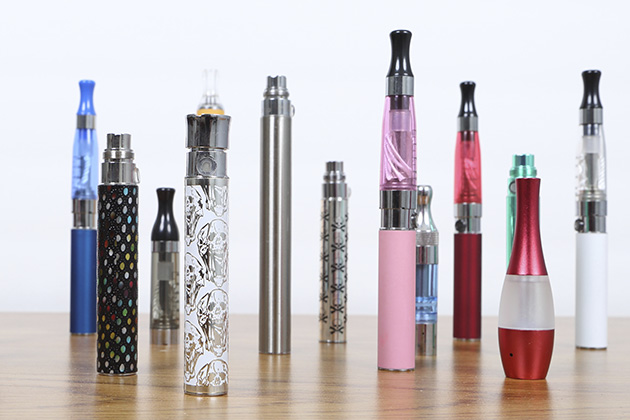Just over a year ago, UConn Health psychologist Mark Litt predicted in a Q&A with UConn Today that the FDA would probably soon ban the sale of e-cigarettes to those under 18.
This week, the Secretary of Health and Human Services announced such a ban, along with other forms of federal regulation of these nicotine delivery devices.
The new regulations, which take effect 90 days from now, are announced against a backdrop of intense debate, both among the public and among health experts. UConn Today is republishing the post, in which Litt discusses the issues.
Electronic cigarettes seem to have become as ubiquitous as the vapor they produce. Their popularity has been skyrocketing over the past two years, even in the midst of a fierce debate about their potential risks and benefits.
Because they’re new, there is a lack of long-term scientific evidence on their safety. Some experts fear they could lead to nicotine addiction and be a gateway to tobacco smoking, while others say they have enormous potential to help millions of smokers around the world to quit. And now the tobacco companies are weighing in with dire health warnings on their e-cigarette packaging about the dangers of smoking, in an apparent effort to dominate the new and fast-growing industry.
UConn Today asked UConn Health psychologist Mark Litt, who is conducting research on e-cigarette tastes and behaviors, what is currently known about the pros and cons of vaping.
Q. For those not familiar with e-cigarettes, how do they work?
A. The electronic cigarette (e-cigarette) uses a battery-powered heating element known as an atomizer to heat a propylene glycol or glycerin-based liquid solution into an aerosol mist. The mist can contain nicotine and may be flavored with menthol or other flavors. The mist is directed through a tube, and can then be inhaled, simulating the act of tobacco smoking, but without delivering the toxic products of tobacco combustion.
Q. Why do people smoke them, what is their appeal?
A. There are a lot of reasons why people use e-cigarettes. Many cigarette smokers use them because they think they are safer than regular cigarettes. Among teenagers, those most likely to use e-cigarettes are those who have already tried cigarettes. In part they are attracted to e-cigarettes because they seem less harsh than cigarettes, and because of the many flavors available. At this time there are numerous unregulated manufacturers of e-liquid, and they are producing dozens of flavors. Flavors can be anything from menthol and tobacco-flavor to coconut, chocolate, vanilla, or mango. In addition, with some types of e-cigarettes the user can mix his or her own e-liquid, and can therefore mix up any variety of flavor combinations.
Q. Are e-cigs safer than traditional cigarettes?
A. It is not known right now if e-cigarettes are safer than traditional cigarettes. It is true that some of the most dangerous ingredients in regular cigarettes are the products of combustion – the chemicals that are produced when processed tobacco burns. Because e-cigarettes do not burn tobacco they do not carry those dangers. However, the e-liquids themselves may have any number of ingredients that we don’t know about. Because there are currently no regulations on e-cigarettes or e-liquids, and because ingredients and quality control measures can vary widely across manufacturers, it is often not possible to know what you’re getting when you use an e-cigarette. The Food and Drug Administration is starting to address some of these issues. They have been funding a large research effort in the past two years to discover what is in e-cigarette vapor, and to find out how e-cigarettes are being used.
Q. Do they help people quit smoking traditional cigs?
A. We don’t really know yet whether people can use e-cigarettes to help stop smoking. Certainly, many people hoped e-cigarettes would help people stop smoking regular cigarettes. Because they deliver nicotine, e-cigarettes might act like other nicotine replacement products, such as nicotine gum. And because the act of using e-cigarettes is much like smoking, they might be more effective than gum at delivering nicotine in the same way that cigarettes do. To date, however, there has not been very much controlled research using e-cigs to help people stop smoking. Some small uncontrolled trials have shown some effects for e-cigarettes, but the only controlled trials of e-cigarettes have not shown very strong effects. This is an important area of research right now, and I expect that in the next year or so we will have results from some large well-controlled trials of e-cigs.
Q. There is a concern about teenage use – are they more likely to “graduate” to traditional cigarettes if they start smoking e-cigs?
A. Many people are concerned that using e-cigarettes may lead teenagers to start smoking traditional cigarettes. As of now we don’t know the answer to this. For one thing, most of the teenage users of e-cigarettes started as users of regular cigarettes, rather than the other way around. The number of teenagers who have gone directly to e-cigarettes is currently small, but rising rapidly as peers start using them. As for progression to regular cigarettes, there is one large study from the CDC that indicated that teenagers who were using e-cigarettes were several times more likely to say that they intended to smoke regular cigarettes in the future than those who did not use e-cigarettes. This was a study about intentions, however, and not actual behavior. So we don’t really know how this will play out. There is also a concern that early exposure to nicotine, which is the primary drug delivered by e-cigarettes, can prime the person to be more receptive to drugs of all kinds. So, despite the current lack of hard evidence, I foresee that the FDA will probably ban the sale of e-cigarettes to those under 18 in the near future. And if the FDA doesn’t do it, I think that individual states will probably institute regulations like this. Some states are doing this already.



